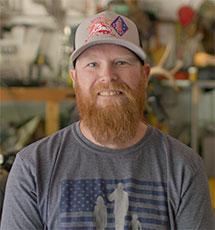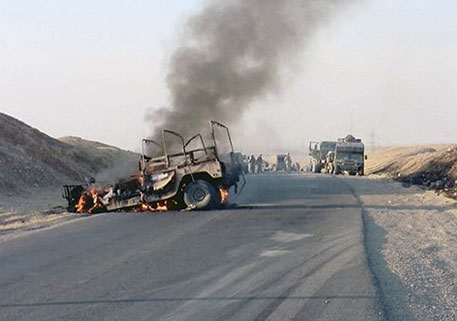 Content warning: This story contains frank descriptions of urban combat that may be disturbing for some readers.
Content warning: This story contains frank descriptions of urban combat that may be disturbing for some readers.
Marine veteran Alex Nicoll remembers Fallujah, Iraq, as a dead city.
When he and others from Company K, 3rd Battalion, 1st Marine Regiment, stepped foot inside the “City of Mosques” in early November 2004, nearly all of the residents were gone. Leaflets dropped by U.S. forces warned of an impending attack and told them to get out. Most listened.
Anyone remaining—estimates put the number between 3,000 and 4,500 extremists—was considered an enemy combatant. They hid in buildings, knew every nook and cranny of the city, and could move silently through a network of tunnels or across rooftops connected by ladders.
“It was so quiet at times that it was just, like, you know it’s going to get crazy. Because once it gets quiet, it means they’re waiting,” Nicoll said.
Seven months earlier, U.S. forces had stormed into Fallujah for the first time to carry out Operation Valiant Resolve—a hasty response to insurgents ambushing, burning and then hanging four U.S. Blackwater civilian contractors from a bridge over the Euphrates River.
U.S. forces took over a third of the city before turning the operation over to the 1,100-person Fallujah Brigade, a Sunni security force, at the urging of the Iraqi government. Not long after, the brigade dissolved and the soldiers turned their weapons over to the insurgents. Twenty-seven U.S. service members died in the first battle.
But allowing Fallujah to remain an insurgent safe haven and base of operations for both Iraqi and foreign extremists jeopardized the future of the country. A second operation was needed.
This time, the drafted plan called for the largest urban assault on a city since the Vietnam War—12,000 personnel from all military branches and Iraqi security forces were tapped to be the attacking force.
The prevailing hope was that the feints and raids the Marines had been doing since September would lead to political negotiations and a settlement instead of a fight. There was little appetite for a large-scale urban conflict.
Those hoped-for negotiations never came to fruition. On Nov. 8, 2004, Operation Phantom Fury began.
‘HOUSE OF HELL’
The assault brought on by U.S. forces was swift and overwhelming. In a city of over 2,000 city blocks covering 25 square kilometers, the majority of the fighting happened over the course of only a couple of weeks.
Nicoll, who was a private first class during the battle, said 3/1 was the most urban-combat-experienced infantry battalion in the Marine Corps at the time and specifically selected for this operation. Atypically, this was its members’ third deployment together and their second to Iraq; stop-loss orders kept much of the unit intact.
“I don’t know if it’s happened too many times in history that people got to be that close for so many years before you get into combat,” Nicoll said.
They knew what they were doing, trusted each other and were ready to fight.
“It’s pretty impressive when rules of engagement are thrown out the window, the wall of lead that comes with Marines,” said Nicoll. “I’m glad I got to see that. For a just reason or not? That’s debatable. But it’s irrelevant, too. We got to be a part of Marines being unleashed.”
Five days into the assault, on Nov. 13, Nicoll’s squad was on patrol in the southwestern part of the city. He had just come out of an abandoned Iraqi shop with a pack of cigarettes when a call for help came over the radio.
A firefight had broken out in a nearby house. Injured Marines were trapped inside. Nicoll’s squad ran toward the building with 1st Sgt. Brad Kasal, a senior enlisted Marine from another company, joining them.
Where they stood would become known as the “House of Hell.”
The only way they could get to the injured Marines was to run through an open room covered by fire from above by insurgents. They ran through the kill zone to where the other Marines were.
Cpl. Robert Mitchell, Nicoll’s squad leader and a close friend, started providing first aid to the injured Marines while Nicoll and Kasal focused on helping kill the rest of the enemy fighters in the house. But this meant they had to go back through the open room. As they ran through the room for cover in a stairwell closet, insurgents opened fire.
Nicoll said bullets rained down on them from the second story. He got hit in the left leg and once in the chest. Kasal got hit several times in his legs, too. An insurgent then threw a grenade at them. Kasal grabbed Nicoll and pulled him in, shielding Nicoll with his body to protect him from the blast while absorbing the shrapnel with his own body.
According to Nicoll’s recollection, that’s when Mitchell came running to where they were—across the same kill zone—and started ripping Nicoll’s gear off. His body armor had stopped the bullet from piercing his chest, but the impact fractured all his ribs and punctured a lung. He was having trouble breathing.
“Once you can’t take a breath, there’s really no pain,” Nicoll said. “You know, every part of your body is, like, just pulling for that last breath.”
Mitchell put a tourniquet on Nicoll’s leg and continued treating the two Marines’ other wounds. As he did, an Iraqi insurgent lying in the room who they thought was dead took a breath and reached for his weapon. Mitchell saw him, but his own rifle had been damaged by enemy fire. All he had was his combat knife.
“With his rifle inoperable, he drew his combat knife, stabbed the insurgent, and eliminated him instantly,” reads Mitchell’s Navy Cross award citation from the incident.
Nicoll said the moment was much more gruesome than the citation’s description; even as his life faded, he turned his head away when Mitchell went in for the kill.
“I hope that’s the single-most ruthless act of violence I’ll ever have to witness,” Nicoll said. “It was about as hard as it gets.”
THE AFTERMATH
Mitchell, who was also wounded inside the house, was able to coordinate evacuation of all the wounded before Marines used demolition charges and leveled the house.
What happened inside the House of Hell that day instantly became an indelible part of Marine Corps history and lore. Tactically, the lessons learned from the ambush changed the way Marines conduct urban assaults on houses.
Nicoll, who was medically evacuated out of Iraq, had to have his left leg amputated below the knee and began a long journey of recovery.
His attitude inside Walter Reed Army Medical Center in Washington, D.C., was positive. His father was by his side. Nicoll praised his therapist and his care team, and he enjoyed the attention from the media and military leadership who visited.
But once he left the hospital, he said he found himself retired at 23 years old with no transferable skills and nothing to do. He became nomadic and reclusive, living in the woods, feeling worthless and disconnected.
“I went years thinking I’m never going to be a part of anything like that. I’m never going to be as good at anything than I was at combat,” said Nicoll. “I felt like I had already served my purpose, which is a horrible way to look at it. But that’s how I looked at it for a while.”
Nicoll said it took about 15 years before he discovered the trades and refound purpose in his life. He now works as a motorcycle mechanic.
He also races motorcycles—calling his home’s garage world headquarters for One Foot in the Grave Racing—saying the adrenaline rush is a needed reminder that he’s not invincible.
Nicoll said he finds comfort in having regular contact with Marines he served with. He lives near several of them and vows to never live more than an hour from at least one of them. Mitchell visits at least once a year. They all regularly check in on each other.
“You’re never going to get those buddies again,” Nicoll said.
Reflecting on his experiences in Fallujah 20 years later, he said he’s almost at the point where he’ll have lived more of his life as an amputee than with two legs, but it’s normal to him now. He’s been through every emotion about the war itself, but has no regrets.
“I got to be in combat and do exactly what we trained to do, and we did it,” Nicoll said. “And we did it well.”
Learn more about Fallujah: 20 Years Later at fallujahstories.org.






